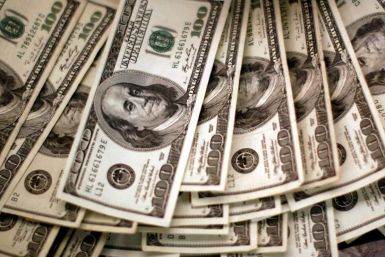OPEC has kept to its forecast that world oil demand will exceed pre-pandemic levels in 2022, but said Russia's invasion of Ukraine and developments around the coronavirus pandemic pose a considerable risk.
OPEC has stuck with its forecast that world oil demand will exceed pre-pandemic levels in 2022, although the producer group said Russia's invasion of Ukraine and developments around the coronavirus pandemic pose a considerable risk.
Euro area interbank borrowing rates saw their biggest daily jumps in over 10 years on Tuesday, reflecting huge increases in market expectations for European Central Bank rate hikes.
Investors have dramatically raised their bets that the U.S.
The S&P 500 ended lower on Tuesday as the index was unable to bounce from a sharp sell-off in the prior session with a key policy statement from the Federal Reserve on deck that will reveal how aggressive the central bank's policy path will be.
U.S. stocks on Tuesday extended losses from a bruising previous session in which the S&P 500 confirmed a bear market as investors braced for an aggressive interest rate hike by the Federal Reserve this week.
Germany is struggling to find a way to wrest control of a Russian-owned refinery that supplies most of Berlin's fuel, four people close to the matter said, fearing retaliation by Moscow if the site is nationalised and as Western firms hesitate to step in.
World oil demand growth will slow in 2023, OPEC delegates and industry sources said, as surging crude and fuel prices help drive up inflation and act as a drag on the global economy.
Federal Reserve Chair Jerome Powell used his first four years as the world's top central banker to reshape U.S.
The Swiss National Bank will keep its negative policy interest rate unchanged on Thursday and will not raise it to zero until early next year, according to a majority of economists polled by Reuters, despite the highest inflation in 14 years.
Britain's jobless rate rose for the first time since late 2020 and other measures of the country's hot labour market cooled, potentially easing inflation worries at the Bank of England which is due to raise rates again this week.
While the S&P 500 confirmed on Monday that it has been in a bear market since January, many of the benchmark's components are in far worse shape following months of fear-driven selling related to rising interest rates and worries about the economy.
Oil prices seesawed in positive and negative territory on Tuesday, holding up despite recession fears and potential new COVID-19 curbs in China that could dampen demand as the market remains tightly supplied.
Oil prices rose on Tuesday as tight global supply outweighed worries that fuel demand would be hit by a possible recession and fresh COVID-19 curbs in China.
Japanese Finance Minister Shunichi Suzuki on Tuesday reiterated his concerns about the recent rapid yen weakening, saying the government will coordinate any appropriate steps with the Bank of Japan as the currency slid to 24-year lows to the dollar.
The Bank of Japan ramped up bond buying on Tuesday as its yield cap came under renewed pressure from rising global interest rates, highlighting its difficulty in remaining a dovish outlier in a global wave of monetary tightening.
Asian shares tumbled on Tuesday after Wall Street officially entered bear market territory and bond yields hit a two-decade high on fears aggressive U.S.
Asian shares slid sharply and the safe-haven dollar held near a two-decade peak on Tuesday after Wall Street hit a confirmed bear market milestone on fears aggressive U.S.
Asian shares tumbled on Tuesday after Wall Street hit a confirmed bear market milestone and bond yields struck a two-decade high on fears aggressive U.S.
World shares inched higher and Wall Street was tipped for a stronger open on Tuesday, as U.S. Treasury yields steadied at multi-year highs following the worst selloff in years.
U.S. Treasury yields held near multi-year highs on Tuesday, while stock markets reeled from the previous session's rout on signs that central banks' action to curb inflation would tip the world economy into recession.
Global stocks and bonds stemmed heavy losses on Tuesday in choppy trade as investors tried to recover from the previous day's rout, while bracing themselves for an U.S.
The U.S. dollar stood by a fresh 20-year peak on Tuesday and just about everything else nursed losses as investors braced for aggressive Federal Reserve rate hikes and a possible recession.
The U.S. dollar stood just below a 20-year peak on Tuesday and just about everything else nursed losses as investors braced for aggressive Federal Reserve rate hikes and a possible recession.
The U.S. dollar consolidated gains near a 20-year peak on Tuesday while its rivals from the Aussie to the euro nursed steep losses as traders braced for aggressive interest rate hikes from the Federal Reserve this week.
Eroding inflation data and fast-changing views in financial markets on Monday have opened the door to a larger-than-expected three-quarter-percentage point interest rate increase when Federal Reserve officials meet this week.
A closely watched part of the U.S. Treasury yield curve inverted on Monday for the first time since April following hotter-than-anticipated inflation data last week.
Additional measures will be needed to bring Pakistan's budget for FY2022-23 in line with the key objectives of its International Monetary Fund programme, the lender's resident representative in Islamabad said on Monday.
The benchmark S&P 500 was down more than 20% from its Jan.
Francesco Giavazzi, the closest economic adviser to Italian Prime Minister Mario Draghi, said on Monday that European Central Bank interest rate hikes were not the right way to curb surging price rises.




































